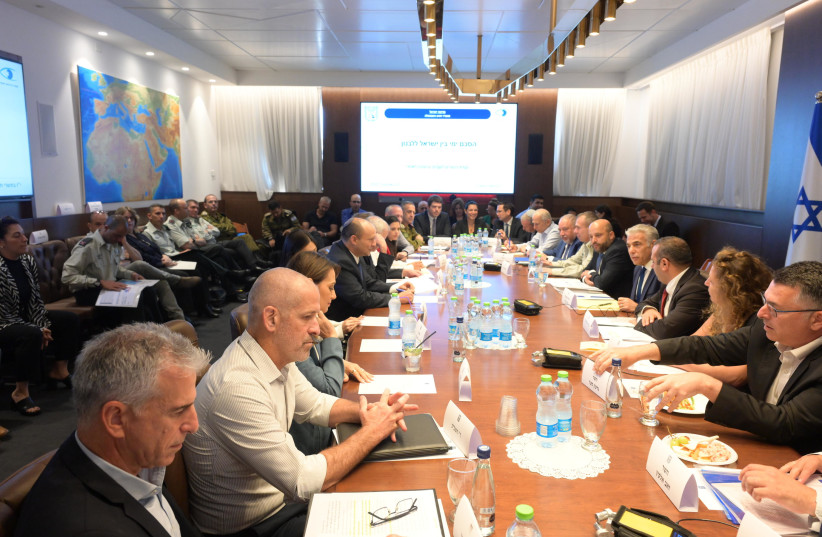The text of the US-mediated agreement between Israel and Lebanon was revealed on Wednesday and it describes a “permanent and equitable resolution regarding its maritime dispute.”
“The United States... understands [Lebanon/Israel] is prepared to establish its permanent maritime boundary, and conclude a permanent and equitable resolution regarding its maritime dispute with [Israel/Lebanon],” the agreement reads.
It comes in the form of letter exchanges between the US and Lebanon and the US and Israel, as well as letters from Lebanon and Israel to the UN, depositing the maritime boundary agreement, including coordinates. The parties agreed not to submit further charts or coordinates to the UN.
Lebanon does not recognize the State of Israel, and as such will not sign an agreement directly with it, but the exchanges of letters are recognized as an agreement under international law. Lebanon’s non-recognition of Israel also impacts the wording of the agreement, such that Lebanon is recognizing the extent of its own economic waters in its letter, and not where Israel’s begin.
Meet me at Naquora

The agreement also states that representatives of Israel and Lebanon plan to meet at Naqoura, on the border between the countries, to finalize the agreement “in the near future.”
The coordinates listed in the agreement mean that the entire triangle of the Mediterranean Sea in dispute between Lebanon and Israel will be Lebanese economic waters, with the southern boundary known as “line 23.”
The agreement specifically states that the “status quo” regarding the lack of an agreed-upon border between Israel and Lebanon remains the same, including territorial waters near the shore “including along and as defined by the current buoy line.”
The “buoy line” is a physical obstacle in the Mediterranean Sea that extends 5 km. from the Israel-Lebanon land border point, but not it does not extend the full length of its territorial waters. In that area, close to the shore, the gaps between Israeli and Lebanese demands were a matter of tens of meters, and the final two of the 10 buoys in a row were already placed along line 23 after the IDF withdrew from southern Lebanon in 2000.
One kilometer down
Israel is conceding about one square kilometer of its territorial waters, National Security Adviser Eyal Hulata said in a press briefing.
The agreement addresses the fact that there is an unknown quantity of natural gas in the Kana Field, which extends from Lebanese waters, across the disputed area – which will become Lebanon’s – and into Israel.
Lebanon must license “one or more reputable, international corporations that are not subject to international sanctions... and that are not Israeli or Lebanese corporations” to develop Kana. TotalEnergies, the French drilling firm, currently holds the license and meets those criteria, but any successors would also be bound by the same rules.
Exploration of the reservoir can begin after the agreement takes effect and Israel will not object to “reasonable and necessary activities,” including drilling immediately south of the maritime boundary line, as long as it is notified in advance.
“Israel will be remunerated by the Block 9 Operator [TotalEnergies] for its rights to any potential deposits in the Prospect [Kana] and to that end, Israel and the Block 9 Operator will sign a financial agreement prior to [its]... final investment decision,” the agreement states.
Energy Ministry Director-General Lior Schillat said that while the agreement between Israel and Total has yet to be finalized, Israel will be “selling its gas in the reservoir for 100% of its value, as if it was developing [the field] itself.”
The agreement will be for Total to buy out Israel’s portion of Kana, which is about 17%, and the amount will be calculated after the French firm explores the reservoir and evaluates it, Schillat explained. The first payment must be made before any development. In addition, the agreement will allow for adjustments to the amount Israel receives, commensurate with how much gas is actually extracted.
The agreement also states that “Lebanon is not responsible for, or party to, any arrangement between the Block 9 Operator and Israel.”
If other natural resources are found in the disputed area and one party exploiting it would deplete the other party’s deposit of that resource, the US will mediate “with a view to reaching an understanding on the allocation of rights.”
Any dispute on the interpretation or implementation of the agreement is to be facilitated by the US.
The agreement does not address any enforcement mechanism or assurances in light of Lebanon’s extreme government instability or that Hezbollah, the Iran-backed terrorist group that is part of the Lebanese government, will not sabotage the deal.
In fact, when asked if Lebanon gave any guarantees that Hezbollah will not render the deal irrelevant, a senior US official said on Tuesday night that “US mediation did not include discussions with Hezbollah. This is with the sovereign leadership of Lebanon... and I have every assurance that the government of Lebanon intends to keep its end of this agreement, as I have on the Israeli side.”
Prime Minister Yair Lapid and National Security Adviser Eyal Hulata sought to assuage concerns over Hezbollah benefiting from the deal, emphasizing that any income for Lebanon from Kana will not go to Hezbollah.
“The Government of Lebanon has been under the threat of sanctions if any of its income goes to Hezbollah, and therefore has not allowed it to happen for years,” Hulata argued. “This agreement is not different from others that Lebanon has signed; funds will not go to Hezbollah.”
Israel is expected to receive a letter of guarantees from US that, in addition to committing to the details of the agreement, would say that the US will ensure Lebanon’s income from the reservoir will not reach Hezbollah in accordance with US sanctions.
